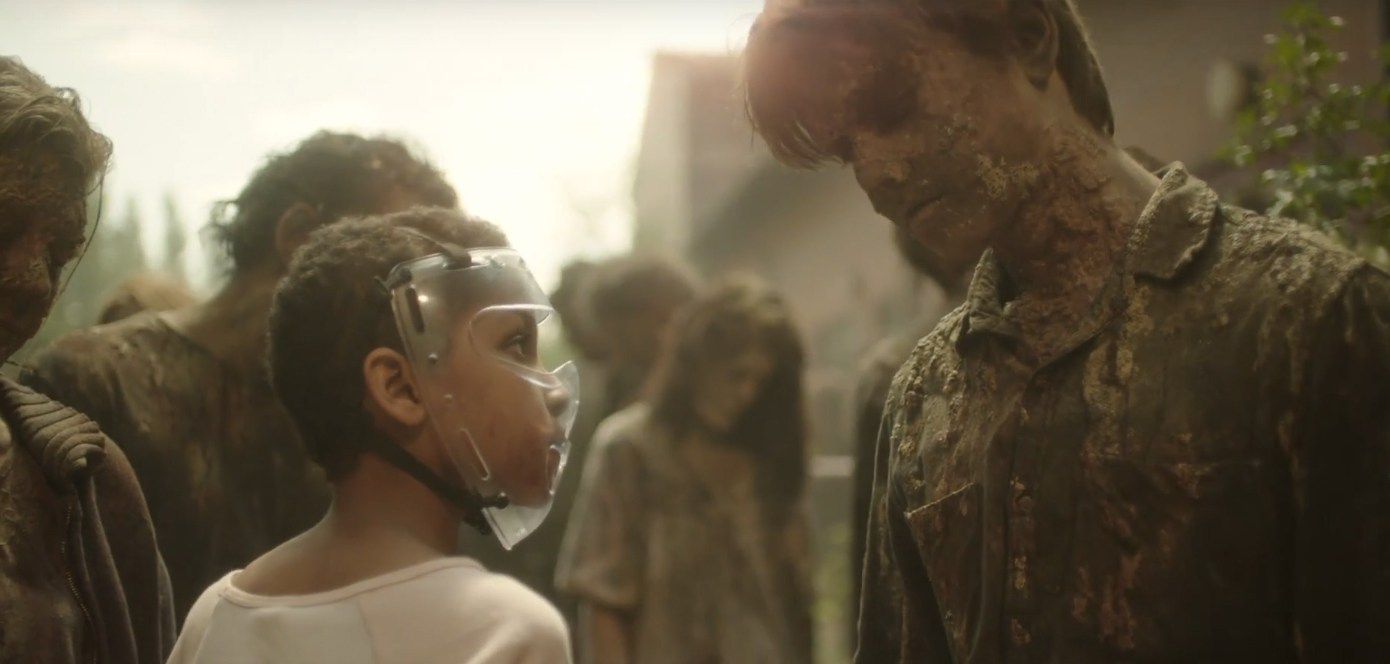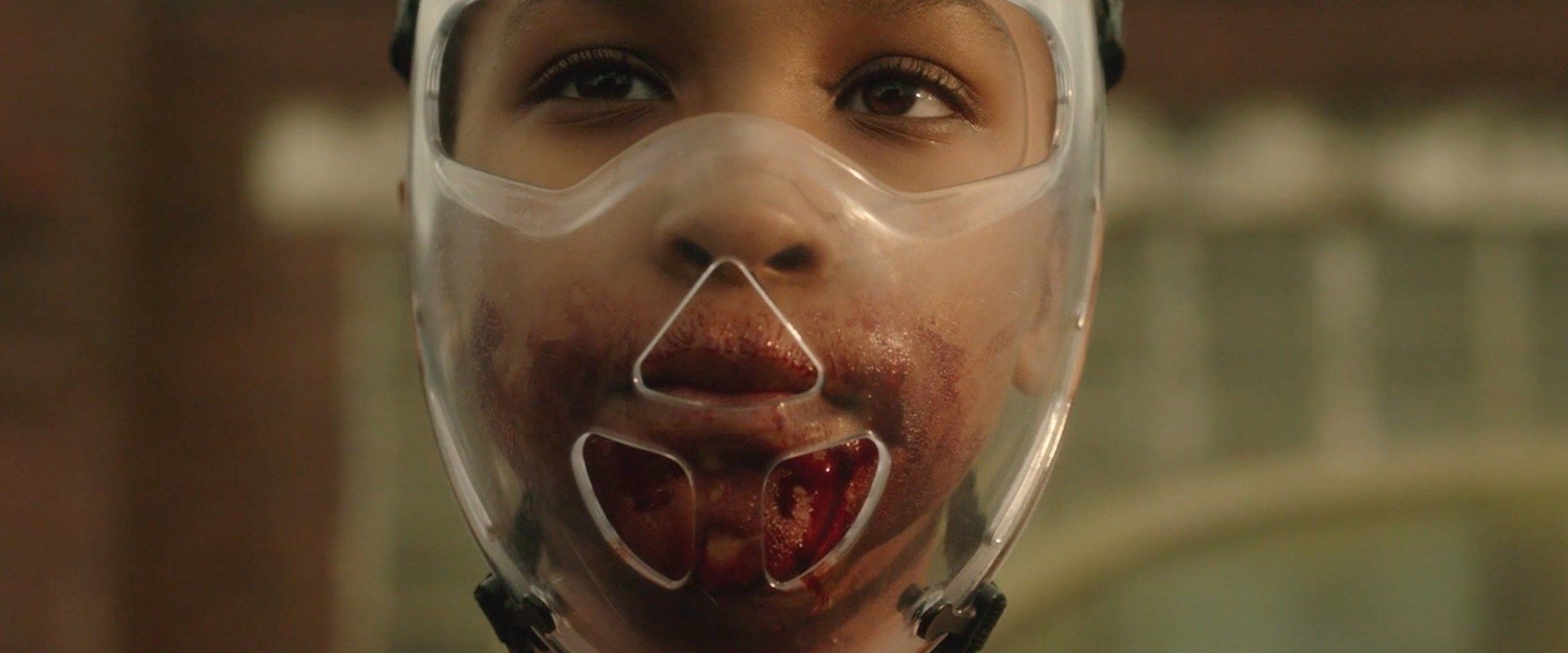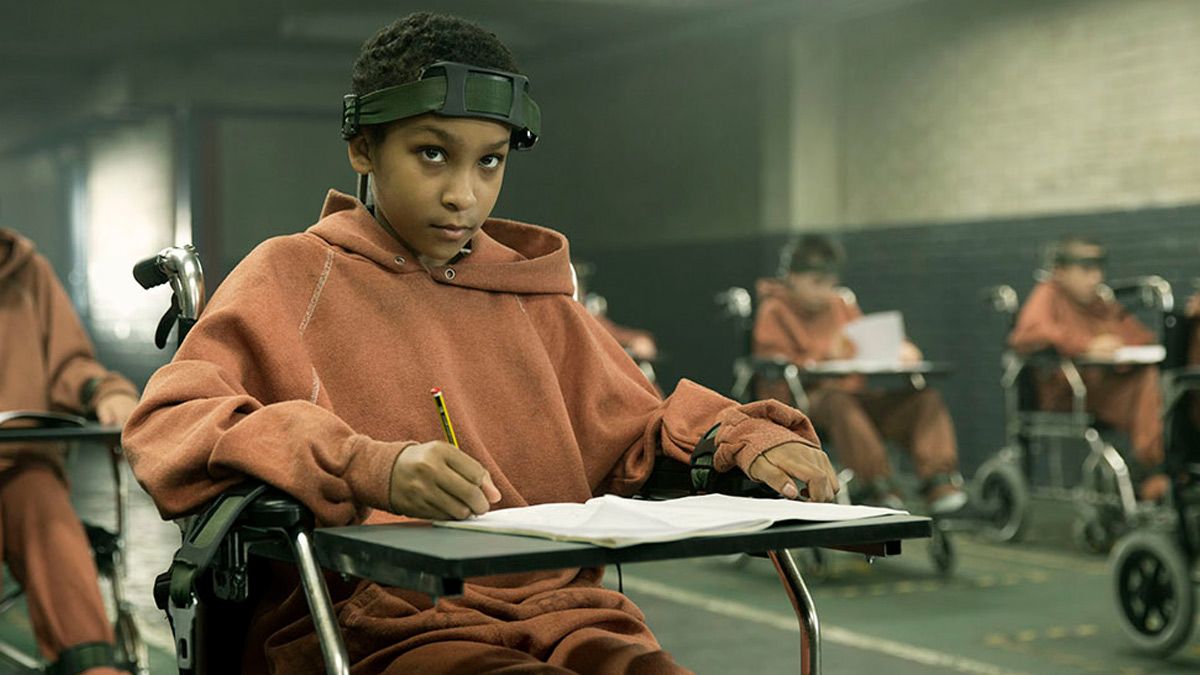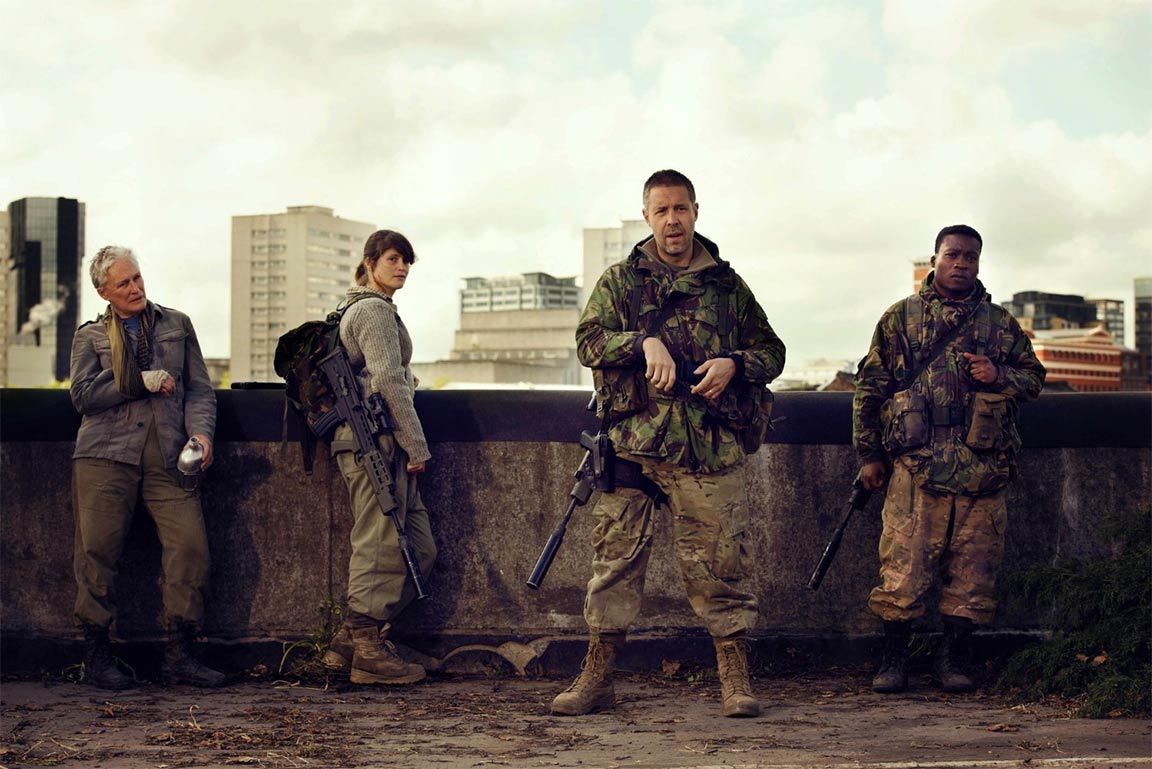Writer Mike Carey has quite a storied career in comics. He's scripted numerous Vertigo books such as The Unwritten, Hellblazer, Lucifer, and multiple other titles affiliated with The Sandman franchise. He's tackled superhero series for DC and Marvel Comics, writing characters such as the X-Men, Fantastic Four, Batman and Doctor Strange. However, 2014 was a watermark for his career in terms of prose and film, as he published The Girl with All the Gifts, a science-fiction novel depicting a dystopian future engulfed by zombie-like creatures after most of humanity is wiped out by a fungal infection.
The Girl With All the Gifts Is the Perfect, Unofficial Last of Us Film
Carey had written the screenplay in tandem with the book, and it was placed on the 2014 Brit List (a list of the best unproduced screenplays in British film). Eventually, it got picked up with Colm McCarthy (Doctor Who, Sherlock, Peaky Blinders) directing. The movie stars Gemma Arterton as Helen Justineau, a doctor who was trying to help an infected girl, Melanie (played by debutant Sennia Nanua) seen as the key to curing the outbreak at an army base in England. Glenn Close featured as the antagonist, a heartless scientist, Dr. Caroline Caldwell, while Paddy Considine starred as the cynical Sargent Eddie Parks who led them away as part of an escape team after the base was overrun by a horde. We spoke with Carey on both the film and the novel, and the journey he took in making both a reality.
CBR: Where did the original idea for Girl With All The Gifts come from?
Mike Carey: It was part of an anthology that Charlaine Harris, who did True Blood, worked on. They would take a theme that was very banal and ordinary, and the brief would be to write a dark fantasy story around it, or a horror story. Or a supernatural story. The year I said I would do a story for them, the theme was "school days," so I had to write a story set in a school. So the first image that came into my mind was Melanie in the classroom writing an essay about what I want to do when I grow up. Only she's a little zombie girl, but she doesn't know that. Only we know that. We can see what she can't, which is she's not going to be allowed to grow up as she's one of the undead. That's the initial image when I wrote the short story, which is just about the relationship with Miss Justineau and the relationship with Sergeant Parks. And it ends where the base's fences fall down and is overrun. I sent it in and it did very well. It was nominated for an Edgar Allan Poe Award, but then I couldn't put the story down. I kept thinking, there's more to this. More to Melanie, more to the situation here. So I pitched the novel and the movie at the same time and ended up writing them back to back.
In terms of the novel -- being so experienced in comics, why didn't you pitch it as a graphic novel or a comic book?
I guess because it started as a short story, it was already prose. I already had Melanie's world in my head in that kind of verbal medium and so it made sense to carry on as prose. The movie was kind of an accident really. I had been talking to a producer on a completely different project and at a certain point that project fell apart and it was immediately after I wrote this short story, the producer, who was Camille Gatin, said "What else have you got?"-- I said well there's this, and I showed her the short story and we started working on the movie at the same time I was writing the novel.
Was it challenging, pitching the movie at the same time?
It was incredibly liberating. You would think it would be confusing and complicated but what it meant was that I was living in that world all the time. When I wasn't writing the novel, I was writing a breakdown or a draft for the movie. I was there with Melanie all the time and each version clarified all the decisions for the other version. We ended up doing things differently in the movie than in the novel and some of the elements didn't make it across as it's a different toolbox to fit this set of storytelling devices. It actually made things easier as I gained some momentum out of it. I felt like was moving forward very fast, putting ideas together very fast and getting sense of where the story needed to go and the characters arcs and so on.
And how long did all of this writing take?
Inevitably, the novel was finished first because films have long production cycles. Getting a workable draft could easily take a year and then you take it to production partners to try to get a budget for the film, to try to get a distributor, a sales agent and so on. So all those things are separate hurdles you have to overcome before you can even start shooting. I delivered the novel around March 2013 and we didn't start shooting the film until summer 2015.
In terms of the production, did you have a hands-on role?
I got to be on set for most of the time, which was a wonderful experience. To be honest, they didn't need me. They had the finished draft and knew exactly what they were doing. At that point the writer's job is finished and has to step back and then wait for the finished thing to come out. But in this instance, I was working with Colm, the director, and everyone was on board with it from the very start. We did everything together and they didn't want to cut me out of the process. They invited me up onto the shoot, invented things for me to do, small rewrites, bits of creative input, and also gave me a cameo as a zombie extra [laughs]. It was incredibly organic and immersive. There's nothing in my life that I can really compare it to.
I'll definitely have to re-look at it, then, for that cameo! [Laughs] Now, in terms of the story, why zombies?
Why zombies? Well, zombies are classic horror monsters that writers keep revisiting and exploring and I think with all those great perennial monsters, whether it's zombies, werewolves, vampires or ghosts, they are flexible vehicles and you can use them in different ways. The zombie story then was at an interesting crossroads because up to 2008 or so, most zombie narratives all the way back to Romero, had been about the outbreak or the moment when the dead start to rise, or the contamination happens. And it's mostly about people dealing with the breakdown of that civil order, normal life and the threat of the encroaching horde. But what we're seeing now is that most zombie narratives take that stuff as a given. It's happening in background or it already happened when the story starts, and you can use this to do something different, and as a launching off point. Warm Bodies is a love story between a zombie and a living girl, a take on Romeo and Juliet; Zombieland is brilliant black-comedy and a road movie, so zombies are one of these great tropes that keep on giving and the more you explore them, the more you find.
One of our precursors is definitely Mary Shelley's Frankenstein, because when the monster is first created, initially it's not a monster. Physically, it's terrifying but it's still a child and it doesn't become morally monstrous, cruel and vindictive until it gets neglected and abused by its creator. We looked at how the adults responded to Melanie and if they were capable of seeing that this is a vulnerable human being. Obviously, Justineau from the start of the story can make that leap and ultimately, we see Parks make that journey. In the course of the story, they're initially hating her and mistrusting her, locking down any feelings they may have, but they increasingly come to trust and respect her. And in the end we see Caldwell very reluctantly brought to the point where she has to recognize Melanie's humanity, and then being destroyed by that realization and admission.
Was there a fear of zombie saturation, story-wise?
It was potentially a problem when we were trying to sell the idea of the film to production partners but what all of those people were interested in was "What are you doing with this genre and trope?" The BFI [British Film Institute] in particular have a remit to support works by creators who are just coming into the medium and works that have artistic merit and something to say, or are at least a little bit commercial so as to find an audience. We were able to pitch into that space. It's something that people say a lot -- "Oh, my God, not another zombie movie!" -- but there are always going to be stories that move the tropes forward in creative ways and narratives that just retread old ideas and conventions. We had confidence that we were doing something that hadn't been done before.
On that note, do you think it's this dichotomy between the human and zombie side of things, and the emotive element, which differentiates it from the other stories out there?
I think one of our selling points is that this is a zombie story told from the POV of a zombie. Most horror stories are about meetings of the self and the other or outsider or monster. In this case, our monster is also an idealized child, an innocent that means no harm -- intelligent, brave, compassionate. She's the daughter you'd love to have, if not for the fact that she was capable of killing you and eating you. [Laughs]
What was it like seeing your story brought to life?
It was unbelievable and an incredible pleasure to watch those actors reading my lines. It was a revelation seeing what they brought to the process. But the film stands or falls by Melanie's performance and Sennia was a newcomer in her first-ever feature. She's on-screen for pretty much the whole time. It was an awful lot to ask of a 12 year-old, and she did a stunning job.
The performance speaks for itself. Some credit goes to Colm, because he recognized it's all about Melanie so he directed the adults to focus in on Sennia the whole time. Back to your earlier question about Glenn, Gemma and Paddy, it was incredibly rewarding. Glenn asked Colm early on whether she should use a British accent and he said just speak as yourself and so she said, "Well I'm an American scientist who was in the UK when the world fell apart so I wonder where my family is." She decided to wear a wedding ring the entire way through as a reminder to herself that she's someone who probably had another context and life, and she'd been cut off from that. All of this comes into her final confrontation with Melanie.
There weren't really villains in this film because you kind of empathized with everyone and felt for them. In both versions of the story, I didn't want to have pantomime villains whose motive was villainy. Caldwell doesn't think of herself as evil. She convinced herself she isn't dealing with children, but with a fungus that mimics the behavior of children. Parks was a part-time soldier who had to step into this role and shut down certain parts of his personality in order be an effective soldier. One of the most enjoyable things about writing the novel and screenplay was building up the relationship between him and Melanie. They go out into the world and he has to rely on her. He starts to use her as an asset and each time he does, the relationship shifts a bit and he sees her as part of a team he is leading rather than a prisoner. That has its payoffs in the scene where he's dying and he's being transformed. He's infected and he asks Melanie to kill him.
That was a big scene to me. In the movie, he was infected but in the book, he got bitten.
That's right, yeah.
Since you were writing these stories parallel to each other, how did you decide which changes to make for the screenplay?
Some of the decisions made themselves. As I said earlier, every medium is a different toolbox. There are some things that novels do brilliantly and some things movies do brilliantly, and they're not often the same thing. They overlap. In a novel, it's easy to jump from one POV to another and [there] I had five POVs. You get Melanie's thoughts and feelings, but once she's established you see what Justineau's thinking, what Caldwell is thinking, and we move in between the characters; whereas in the movie, it's much harder to do that effectively and you lose momentum if you shift POV so we stayed with Melanie throughout. This was recognizing that different approaches would pay off more. And some things we cut out because we wanted to streamline the narrative. We don't have the Junkers, this group of survivalists who bring the base down. In the movie, it's the zombies and their pressure against the fence. That was partly us removing this element because the story moves faster without it. Also, if you saw them, they'd be dressed in black leather and you'd be thinking of "Mad Max" and that post-apocalyptic story, so we cut them out because they would have created expectations we didn't want.
In the film, Melanie and her team found a lost tribe of wild and infected kids after leaving the base, and one thing I noticed was at the core of them was innocence and childhood. Could you give us a little bit of insight into that?
Yeah, there's a sense there that the found children in London are there by the grace of God. They're another version of Melanie, They're where she would be without receiving education at the base. They're almost like a pre-human species -- they do gestures and one or two vocalizations. They're as potentially intelligent, but they just haven't had the conceptual step-up. We wanted to suggest that this is a new human race just coming into its own. The decision that Melanie has to face at the end is does the world belong to the old humans or the new? They can't coexist.
By the way, how did you find yourselves going the route of the fungal infection as the source of the outbreak?
That came out of a discussion between me, Colm and Camille early on. In the short story, I kind of cheated. I just said it was a virus and left it at that. When we were working the pitch, we all felt it felt feeble like a default setting and given that the search for a scientific cure was so important in the story, we wanted to make sure the disease was properly explained. So I went shopping for a pathogen, one that would feel was convincing and one that could bring an iconography with it. I remembered that I had seen footage of the Cordyceps fungi attacking an ant in a BBC documentary with David Attenborough so I went back, did some research and thought this was the one.
In terms of the story itself, it ends on an open note so do you think you'd be expanding the universe especially with Melanie, in terms of a prequel or a sequel?
I'm definitely not finished. After the book came out, it was very successful. I talked with my publishers who asked me if a sequel is possible and I said no, because if you think about how the story ends, the sequel would be a completely different genre. It would be about the politics and the sociology of making a new world and society so it wouldn't add up. But it occurred to me that you could go backwards in time because the novel is set about 20 years after the breakdown of society; and the movie... about 10 years after. In both versions of the story, there's a moment when they find the "Rosalind Franklin," this big armored mobile laboratory, and it's abandoned in the middle of London. In the movie, it's completely empty and in the novel you've got one dead body but in both cases, you've got the question -- what happened to the crew and why is it just lying there? There's some superficial damage to the engine but in both cases, Parks is able to get it moving again quite quickly so I decided to tell that story of what happened in the years after the breakdown and how these human survivors ended up here in this place called "Beacon" on the South Coast. By the end of the story, you also get a sense of what Melanie's brave new world is going to look like. It's called The Boy On The Bridge and it comes out in May.
So this would be running alongside in the same timeline?
Yeah -- my publishers are calling it a standalone novel, which I think is fair because it doesn't have any of the same characters in it. You get some references to Caldwell, Justineau and to the end, some Melanie, but it's a completely different core cast and separate story. But you could call it a prequel because it explains some of where those characters were coming from in the greater novel.
Any discussions on adapting the sequel for another medium? Film again or television?
We talked about it, but it's way too early to tell. I am working on another movie project with Colm and Camille.
In terms of the comic medium by the way, how does it feel as someone who did stuff with Vertigo to see Preacher and other indie titles, as well as other smaller publishers, on the big and small screens?
I think it's very cool. I loved Doctor Strange, and Deadpool, too. As a big fan of the [Steve] Ditko Strange, one of the things that impressed me was that magic was a physical thing and when Strange fought Mordo, they threw battering rams and blocked with magic and in the movie, they created a visual vocabulary that worked. l loved films like "A History of Violence" and "Men in Black," which were non-superhero comic stories but I guess I'm a little bit perturbed by this new model coming through where a publisher will develop a comic as a storyboard for a film or TV project. I think comics don't need to be translated. They're great in and of themselves. It's cool when they get bought up and somebody reimagines them but a lot of my favorite comics would be difficult to do in any other medium. I love Grant Morrison's Doom Patrol, and it's very hard to imagine translating that. Maybe an HBO series could do it justice, but it would be very hard.





